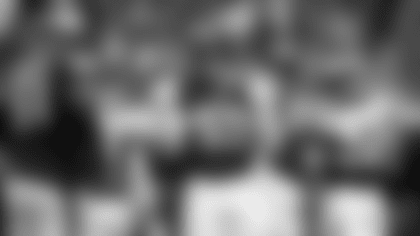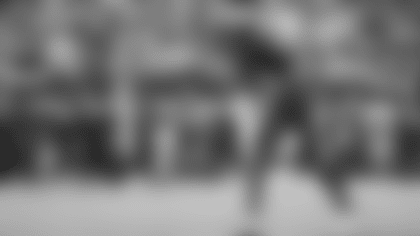When Adam and Caitlin Thielen founded the Thielen Foundation in 2018, they emphasized finding an overlooked area of the community to support.
As parents, they were drawn to young patients at the University of Minnesota Masonic Children's Hospital; the Vikings after all have a long-standing relationship with the medical center.
That's just it, though. The Vikings – as well as other local sports teams – have a strong presence at the hospital. Young people battling cancer, recovering from bone marrow transplants, undergoing significant surgeries, have been on the radar of many.
Important work has been done by the likes of John Sullivan, Chad Greenway and Kyle Rudolph.
So when Adam and Caitlin spoke with hospital leadership about a particular area of need, the answer was clear: the Pediatric Behavioral Health unit, the region's largest and most comprehensive unit of its kind.

As the Thielen Foundation’s first major gift, University of Minnesota Masonic Children's hospital was presented with a $100,000 donation for the unit, which provides in-patient and out-patient services for youth.
"When we first toured the hospital and the mental health department, it was unbelievable to hear these doctors and nurses … just how shocked they were, number one, that we were there and wanted to help," Adam said recently, "and then number two, how excited they were that we were going to provide resources and how badly they needed it and how badly they needed people to care about these kids.
"People just don't know about it. They don't realize how prevalent it is and how important it is to talk about," he added. "So that really opened our eyes, and since then it's just really changed our mindset on it and how we can help and give back."
The Thielens' Christian faith also has played a significant role in their desire to give back and direction they've focused.
"I felt like God was calling us to kind of spotlight [mental and behavioral health], especially with the platform that Adam has and with how many youth and adults struggle with it," Caitlin said. "It was just a no-brainer for us to try to use our platform and whatever resources we can to try to help this hospital, help these kids and just [amplify] mental health and behavior health [awareness].
"We have really close family members and friends who deal with significant mental and behavioral health [challenges], so it really hits home for us to be more open about it and to [bring awareness to it] and make it more normalized," she added.

The Thielens have worked closely with Dr. Jessica Cici, child psychiatrist and Medical Director of Child and Adolescent Psychiatry at M Health Fairview.
According to Cici, approximately 9 percent of children between the ages of 2 and 17 are diagnosed with Attention Deficit Hyperactivity Disorder (ADHD). Approximately 7.5 percent of children are diagnosed with a behavioral concern, and 7 percent of children in that same age range are diagnosed with anxiety.
"We've seen in recent years that that percentage has increased by several points. I think we're seeing a rise in mental health concerns," Cici said.

Dr. Larry Young, MD, serves as the Vikings in-house psychiatrist but also has a private practice in which he often works with young patients. Similar to Cici's experience, Young has seen a steep uptick in mental illness among youth.
"Although it is difficult to interpret whether this is a result of improved recognition of mental health symptoms, or because of environmental stressors like greater expectations in society, current events, or the social/emotional breakdown of the [COVID-19] pandemic, it does appear that kids and adolescents have been especially vulnerable," Young said. "Unfortunately, in my child/adolescent clinic, it seems like more and more of my patients have been in crisis lately, and I seem to be making an increasing number of referrals to the emergency room and various structured levels of care.
Young added: "The recent research has also shown that ERs everywhere are more overcrowded than ever during this pandemic with kids and teens waiting to be evaluated and hospitalized for suicidal thoughts."
Cici explained that while the symptoms of mental illness may be widely understood in adults, they tend to be less realized in children and adolescents.
Young people often have a harder time articulating exactly how they're feeling; consequently, anxiety or depression may manifest itself as anger or irritability. Cici also encouraged parents to watch for whether their children are attending school – are they missing or avoiding attendance? Are grades dropping? Are they isolating from peers uncharacteristically?

All of these things could potentially be indicators of a mental or emotional situation being navigated.
"An adult may be able to say, 'I'm feeling anxious,' whereas a child might say, 'I have a tummy ache' or 'my head hurts,' and you may not immediately recognize that as a mental health condition," Cici said. "I think the other piece, too, is this enduring stigma that we see with mental health. For a long time, mental health has been viewed somewhat negatively, and I think that resources have not been devoted to youth mental health. We see less funding promoting mental health research and promoting mental health treatment."
The Thielens are hoping to change this.
Making a difference
Adam and Caitlin have made regular visits to patients in the mental and behavioral health unit at U of M Masonic. While the COVID-19 pandemic put a temporary stop to in-person visits, the couple has continued meeting with young people virtually over the past 13 months.
In addition to the monetary donations toward mental health efforts at the hospital, Thielen Foundation also has gifted mats for yoga, which serves as an effective coping tool for many patients, and notebooks.

Adam and Caitlin also have prevalently featured mental health topics on the foundation’s Instagram page, including Q&As with Dr. Cici and other experts.
Through it all, the Thielens have continued to educate themselves and grow a bigger understanding around mental illness, its effect on youth and ways they can help support.
"A lot of times, it doesn't really make sense to me because maybe my issue is different than someone else's," Adam acknowledged. "But when you start to learn and be around it more and try to understand it, it really helps. Especially when you have friends or family [dealing with it], it really helps them, because you can understand it more and you kind of know what to do, what not to do; what to say, what not to say, to really help them with what they're going through.
"And then personally, we all have ups and downs in life," he added. "Trying to navigate that, and being able to really apply those things to your personal life, has been huge for me."
The Thielens' experience and education around mental health also has informed their parenting style.

With two sons – Asher, 4, and Hudson, 2 – and a daughter on the way, Adam and Caitlin hope to foster a healthy environment that encourages communication.
"I want to be open with them as a mom, and for them to be open with me. Adam and I have talked about this: as they grow, we want to have a good connection with our kids. We hope we can. We want them to feel comfortable with us if they're ever going through anything," Caitlin said.
Kindness and empathy are emphasized within and beyond the household.
"You never know what a little boy who might bug you at school is going through at home. Or you never know what he's thinking … There's just so many things that could be happening in other people's lives," Caitlin said. "Even us as adults, I'm trying harder to be more like that. If someone's in a grouchy mood, you never know what they're dealing with. So I think that's a big thing that I want to teach my kids. Every day they go to school, I say, 'Spread God's love.' Just try to be kind and caring to others."
'A good conversation'
From children to adults, athletes to artists, the Thielens hope to continue breaking down the stigma around mental health.
Caitlin, a longtime soccer player, and Adam both are well-aware of the unspoken "toughness" often expected within all levels of sports. But the tide has slowly been turning. The reason for that? Adam believes it's due to the tangible support leagues such as the NFL are providing for players, coaches and staff.

Specifically, the Vikings have an in-house clinical psychiatrist, in-house clinical psychologist and a sports psychologist. They make available a free Employee Assistance Program to anyone within the organization, and the team benefits from the Player Development Program.
"The [number] of resources that teams are putting into it shows that it's a big deal. It is a game-changer for teams to have those resources and to have the opportunity for guys to be open and to say, 'Hey, I have an issue with this' and, 'Can you help me?' And when that happens, it just creates a better culture in the locker room," Adam said. "It creates a more open atmosphere, and guys realize that they're not alone. That maybe there's five, six guys feeling the exact same way that you are. So when you open up about it, now they want to open up about it, and they want to get help.
"I think it's been really cool to see that go through our locker room and see guys transforming and really changing – not only their lives but other people's, as well," he added.
Adam has appreciated hearing from teammates who previously were featured in the Getting Open series, such as linebacker Eric Kendricks and tight end Tyler Conklin.
"The impact that it will make will be bigger than they can ever imagine … Just because I think if one, two, three kids see that and say, 'Wow, that's exactly what I'm going through,' it just creates a more comfortable setting for them to be open and honest," Adam said. "Maybe it's with their family or with friends, to be able to get help. Sometimes just being able to talk about it is enough help to really get them in the right direction. It's really been cool to see those guys do that, and it'll be a huge help to a lot of people."
Understanding others' experiences reiterates that mental illness doesn't discriminate; people of all ages, backgrounds and careers are affected.
"It goes to show that anyone can deal with certain types of mental or behavioral health [challenges] and that it's OK to be open about it," Caitlin said. "It's OK. You don't have to feel like you're 'less-than,' even if you are an athlete. These professional athletes are talking about it, and it's such a good conversation."
Dr. Cici echoed the Thielens' sentiments.
According to Cici, 75 percent of teenagers who are looking online for information about depression are, in actuality, searching for someone to talk about his or her personal accounts around the illness. They're looking for someone to relate to.
"When we see someone that we know or recognize that is talking about mental health concerns, it normalizes that experience for us," Cici said. "So when we see an athlete, who is 'unbreakable' in our eyes, really being vulnerable and talking about their experience with mental health or creating awareness around mental health, that really normalizes it and makes it OK for us to have that experience and to seek help."
You are not alone. If you or a loved one are struggling today, please reach out for support.
National Suicide Prevention Lifeline: 800-273-8255
NAMI (National Alliance on Mental Illness): nami.org
NAMI MN: namimn.org | 651-645-2948
This is the seventh installment of our Getting Open series. Check out earlier features and keep an eye on the Vikings digital platforms for upcoming features:
- Jalyn Holmes’ Describes Battle with Anxiety
- Eric Kendricks & Ally Courtnall Engage in Supporting Mental Health
- Tyler Conklin’s Family Develops Outreach After Tragic Loss
- Harrison Hand Uses Self-Care to Focus on Mental Health
- Vikings Leadership Provides Empathy, Organizational Support for Mental Health
- Chris Hawkey Battles OCD & Depression on Quest to ‘Happy’
By: Lindsey Young






